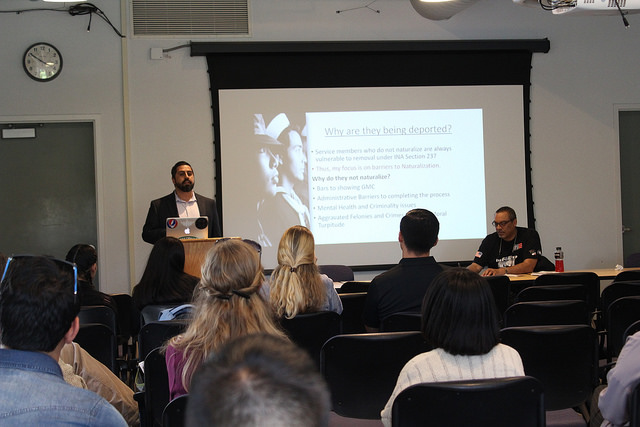The United States deportation policy is affecting military veterans
Jose Orta spoke to a DVC audience about deportation policies during a speaker series.
April 17, 2017
With all the recent policies going into effect, it’s hard to keep track of who’s being affected by what policy.
Diablo Valley College’s Veterans Alliance recently put on a speaker series about the deportation policies and how it has been affecting the veterans who have served in the military.
Jose Orta and Maurice Martin were the two speakers, and talked about deportation policies along with their own personal experience in the military.
“I’ve started doing research on how many veterans have actually been deported and there is some estimates of about 30,000 veterans since 1996,” Orta said.
Orta begins with a video of military veterans who have served in the past, who share their stories of how they got deported.
He then continues on about what non US citizens who want to serve in the military have to do in order to be a part of it. There’s a couple of different procedures that include assessing good moral character, administrative barriers, mental health, and criminality issues.
“The biggest one is good moral character issue, if you’re a regular (foreign) person, not in the military or a veteran, you have to have 5 years of what they call good moral character, you have to show you’re a good person, haven’t committed crimes,” Orta said.
He went on to tell what could happen if you don’t have good moral character, or how other small things could affect your good moral character.
Maurice Martin is a military veteran who is currently majoring peace and conflict studies at the University of California Berkeley. He’s also apart of a California veterans group fair.
Martin mainly talks about his time in the war, what happened after coming back, and what he’s doing now to help with military veterans.
He spoke of how military veterans are held to a higher accountability when they come back from war.
“Are you telling me that the deported veterans that go over there, you encourage them you offer them citizenship, and then when they perform, then you hold them accountability, to a higher standards if they mess up?” Martin said.
They ended with questions from the audience talking about related experiences and more of how every one of us could lend a helping hand to our military veterans who served for our country, like going online and donating to our homeless veterans.







































































